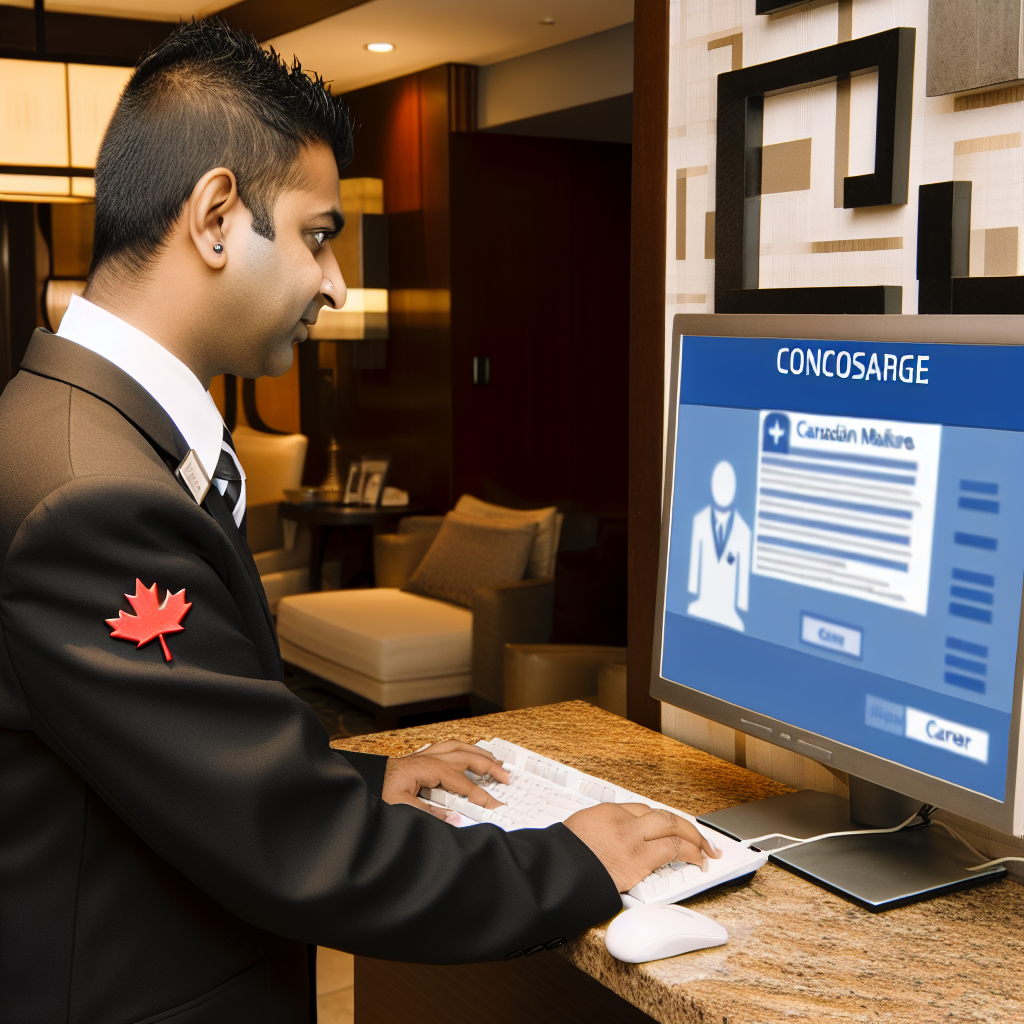Understand the Role and Responsibilities of a Concierge
Overview of Concierge Duties
A concierge serves as a guest liaison in hotels and other establishments.
They provide personalized services to ensure guests have an enjoyable experience.
Furthermore, concierges offer information about local attractions and activities.
They also assist with restaurant reservations, transportation, and special requests.
Overall, concierges play a crucial role in enhancing guest satisfaction.
Essential Skills for Concierges
Strong communication skills are vital for successful concierges.
They must interact effectively with both guests and hotel staff.
Additionally, problem-solving skills help resolve guest issues efficiently.
Organizational abilities allow concierges to manage multiple tasks at once.
Moreover, attention to detail ensures that guest preferences are noted and acted upon.
The Importance of Local Knowledge
Concierges must possess comprehensive knowledge of their location.
This includes understanding popular attractions and hidden gems.
Such knowledge allows concierges to offer tailored recommendations.
They should also stay updated on local events and happenings.
This information can significantly enhance the guest experience.
Team Collaboration and Networking
Successful concierges often collaborate with various service providers.
Establishing relationships with local businesses is crucial.
These connections can help secure exclusive deals for guests.
Furthermore, teamwork within the hotel contributes to a seamless service experience.
Concierges should actively engage with fellow staff members to ensure cohesiveness.
Research the Hospitality Industry in Canada
Overview of the Hospitality Sector
The hospitality industry in Canada is dynamic and diverse.
It includes hotels, restaurants, event planning, and more.
Moreover, the sector employs thousands of Canadians nationwide.
Understanding this industry is crucial for finding concierge roles.
Key Demand Areas
Major cities like Toronto and Vancouver have high demand for concierges.
Unlock Your Career Potential
Visualize a clear path to success with our tailored Career Consulting service. Personalized insights in just 1-3 days.
Get StartedThese urban centers host luxury hotels and premium services.
Additionally, tourist destinations like Banff attract many visitors.
Consequently, job opportunities are abundant in these regions.
Current Trends
The hospitality industry adapts continually to changing consumer needs.
For example, there is an increased focus on personalized service.
Technology integration plays a significant role in enhancing guest experiences.
Furthermore, sustainability is becoming increasingly important in operations.
Potential Employers
Numerous companies offer concierge services across Canada.
- Fairmont Hotels & Resorts
- Marriott International
- Air Canada Vacations
- The Ritz-Carlton.
Exploring their career pages can reveal available positions.
Networking Opportunities
Networking is essential in the hospitality industry.
Attend industry events, conferences, and job fairs.
Moreover, consider joining professional organizations like the Canadian Society of Travel Advisors.
These connections often lead to valuable job leads.
Identify Key Skills Required for Concierge Positions
Excellent Communication Skills
Effective communication is essential in concierge roles.
You must clearly convey information to guests.
Additionally, you should actively listen to their needs.
Furthermore, a friendly demeanor enhances guest interactions.
Strong Customer Service Orientation
Customer service skills are crucial for a successful concierge.
Always prioritize guest satisfaction above all else.
Being proactive helps anticipate potential guest needs.
This can create memorable experiences for visitors.
Problem-Solving Abilities
Being resourceful is vital when challenges arise.
Concierges often face unexpected requests from guests.
You need to think quickly and find suitable solutions.
Moreover, a calm demeanor under pressure is beneficial.
Multilingual Skills
Fluency in multiple languages can set you apart.
It allows you to assist a diverse clientele effectively.
In Canada, many visitors appreciate language flexibility.
Therefore, consider learning additional languages.
Knowledge of Local Attractions
Understanding local attractions enhances your service quality.
Guests will rely on you for recommendations and guidance.
Stay informed about events, restaurants, and activities.
This knowledge builds credibility and trust with guests.
Organizational Skills
Strong organizational skills are vital for efficiency.
Concierges manage multiple tasks simultaneously.
Keeping a well-structured itinerary for guests is necessary.
Effective time management can significantly improve service.
Technological Proficiency
Familiarity with technology is increasingly important.
Concierges often use hotel management systems and apps.
Staying updated on the latest tools enhances your efficiency.
This skill also aids in communication with technical staff.
You Might Also Like: The Importance of Customer Service for Casino Hosts
Build a Professional Network in the Hospitality Sector
Understanding Networking Benefits
Networking plays a crucial role in finding job opportunities.
It allows you to connect with industry professionals.
Additionally, it helps you stay informed about upcoming job openings.
Attend Industry Events
Attend hospitality trade shows and conferences regularly.
Such events provide excellent opportunities to meet industry leaders.
Moreover, you can learn about the latest trends in the hospitality sector.
Engage with speakers and attendees for meaningful connections.
Join Professional Associations
Become a member of reputable hospitality organizations.
Associations often provide access to exclusive job listings.
They also host networking events and workshops.
This membership will expand your professional circle significantly.
Utilize Social Media Platforms
LinkedIn is a valuable tool for professional networking.
Connect with industry professionals and join relevant groups.
Regularly share industry-related content to attract attention.
This proactive approach enhances your visibility in the field.
Engage in Local Community Activities
Volunteering for local events can foster connections.
Community involvement showcases your commitment to hospitality.
Furthermore, it provides opportunities to meet potential employers.
Follow Up and Maintain Relationships
After networking events, follow up with new contacts promptly.
A simple thank-you email can leave a lasting impression.
Keep in touch through occasional messages about industry news.
This helps strengthen professional relationships over time.
Learn More: The Importance of Multitasking for Front Desk Agents
Utilize Job Search Platforms and Websites Specialized in Hospitality
Explore Popular Job Boards
Start your job hunt on popular job boards like Indeed and Glassdoor.
These platforms list numerous concierge positions across Canada.
Use keywords related to hospitality and concierge services for better results.
Check Industry-Specific Websites
Visit industry-specific websites like HCareers and HospitalityOnline.
These platforms focus on hospitality roles and often feature exclusive listings.
Set up job alerts to receive notifications about new opportunities.
Utilize Networking Websites
Networking websites like LinkedIn can enhance your job search.
Create a professional profile highlighting your concierge skills.
Engage with industry groups to expand your connections.
Follow Local Hotels and Resorts
Visit the websites of local hotels and resorts directly.
Check their career pages for job postings not listed elsewhere.
Many establishments prefer hiring candidates who apply directly.
Use Social Media for Job Opportunities
Social media platforms can also provide job leads.
Join hospitality-related groups on Facebook and Twitter.
Follow industry leaders and organizations to stay informed.
Discover More: How to Develop VIP Relationships as a Casino Host
Create a Strong Resume and Cover Letter Tailored for Concierge Jobs
Understand the Importance of Tailored Documents
Tailoring your resume and cover letter is essential for concierge jobs.
Employers seek candidates who fit their specific needs.
A customized application highlights your relevant skills and experiences.
Gather Relevant Experience
Begin by listing your previous roles in hospitality or customer service.
Include experiences that demonstrate your ability to assist guests.
Showcase any prior concierge experience if available.
Highlight roles that required strong problem-solving skills.
Focus on Skills That Matter
Concierge roles require excellent communication skills.
Detail your proficiency in multiple languages if applicable.
Highlight your organizational skills and attention to detail.
Include any technical skills that can assist in concierge tasks.
Crafting Your Resume
Use a clean and professional format for your resume.
Clearly display your contact information at the top.
Begin with a strong objective statement.
This statement should reflect your passion for the concierge role.
List your relevant work experience in reverse chronological order.
Include bullet points to emphasize key responsibilities and achievements.
Writing a Compelling Cover Letter
Your cover letter should complement your resume.
Address the specific employer by name if possible.
Start with an engaging introduction that captures attention.
Highlight why you are a great fit for the role early on.
Provide examples of your achievements relevant to the concierge position.
Final Touches
Proofread both your resume and cover letter thoroughly.
Ensure there are no grammatical or spelling errors.
Consider seeking feedback from a trusted colleague or mentor.
This input can refine your documents further.
Finally, ensure both documents reflect your personality and enthusiasm.
Uncover the Details: Career Growth For Spa Managers In Canada

Prepare for Interviews with Common Concierge-related Questions
Common Interview Questions
Prepare for typical interview questions about concierge roles.
Interviewers often test your customer service skills.
Expect questions about handling difficult situations.
They may inquire about your experience in hospitality.
Be ready to discuss how you prioritize tasks.
Example Questions to Anticipate
- How do you handle an upset guest?
- Can you describe a time you exceeded customer expectations?
- What steps do you take to stay organized?
- How do you approach unfamiliar requests?
- What motivates you in a concierge position?
Practicing Your Responses
Practice your responses to common questions.
Use the STAR method to structure your answers.
Focus on Situation, Task, Action, and Result.
This method helps you deliver clear, concise responses.
Asking Your Own Questions
Prepare questions to ask the interviewer.
Inquire about team dynamics and company culture.
Ask about opportunities for professional development.
This shows your interest in the role and organization.
Explore Internships and Volunteer Opportunities to Gain Experience
The Importance of Gaining Experience
Gaining experience is vital in the concierge industry.
It helps you develop important skills and networks.
Internships and volunteer positions provide hands-on learning.
Additionally, they are a valuable way to boost your resume.
Finding Internships in Canada
Start your search by exploring industry-related websites.
Look for hospitality programs at local colleges and universities.
Many educational institutions offer internship placements.
Networking events can also lead to internship opportunities.
Exploring Volunteer Opportunities
Volunteering enhances your skills and expands your network.
Consider volunteering at hotels or event organizations.
Local tourism boards often seek volunteers as well.
Join community groups that host hospitality events.
Tips for Securing Internships and Volunteer Roles
Craft a tailored resume highlighting your skills.
Write a compelling cover letter for each application.
Practice your interview skills to make a strong impression.
Follow-up with organizations after submitting applications.
Maximizing Your Experience
Once you secure an internship or volunteer position, make the most of it.
Take initiative and seek out responsibilities.
Ask questions and be open to learning from others.
Maintain professionalism and build positive relationships.
Stay Updated on Industry Trends and Developments
Importance of Following Trends
Staying informed about industry trends is crucial for concierges.
It helps you anticipate client needs and preferences.
Additionally, understanding trends enhances your service quality.
Key Sources for Trend Information
Subscribe to industry-related newsletters and publications.
Websites like Hotel News Now provide valuable insights.
Follow influencers and thought leaders on social media platforms.
Professional Organizations and Associations
Join organizations such as the Canadian Concierge Association.
These groups often share the latest industry news and updates.
Networking within these circles can open new job opportunities.
Utilizing Online Resources
Webinars and online courses can keep you knowledgeable.
Platforms like Coursera and Udemy offer relevant courses.
Also, consider joining forums where professionals share advice.
Networking for Success
Attend industry events to make connections with peers.
Networking can lead to referrals and job opportunities.
Be active in local hospitality groups to increase visibility.
Tracking Competitors
Observe what successful concierges are doing in the field.
Research competitors’ offerings to identify service gaps.
Innovating your services based on competitor strategies can be rewarding.
Continuous Professional Development
Invest in certifications to boost your resume and skills.
Consider courses on guest relations and hospitality management.
Keeping your skills updated makes you more marketable.
Consider Certification Programs in Hospitality Management
Importance of Certification
Certification programs enhance your skills in the hospitality industry.
They provide credibility and increase your job prospects.
Employers often prefer candidates with formal training.
Additionally, certifications can set you apart from others.
Types of Hospitality Certifications
There are various certification options available in Canada.
Popular programs include Certified Hospitality Professional (CHP).
Another option is the Certified Hotel Executive (CHE) designation.
Both programs offer valuable training for a successful career.
Moreover, they cover essential aspects of hotel management.
Institutions Offering Certification
Many reputable institutions provide certification programs.
Paissin College offers a comprehensive hospitality management course.
Similarly, George Brown College has various hospitality certifications.
Consider checking out the programs at Ryerson University as well.
Benefits of Certification Programs
Certification programs improve industry knowledge and skills.
They offer networking opportunities with professionals.
Graduates can gain access to exclusive job postings.
Moreover, ongoing education keeps you informed on industry trends.
How to Choose the Right Program
Evaluate the curriculum and ensure it meets your career goals.
Consider the reputation of the institution you choose.
Look for programs that offer hands-on experience.
Additionally, check for flexible scheduling options.
The Certification Process
The certification process typically includes coursework and examinations.
Each program may have different requirements and timelines.
Be prepared to dedicate time for study and preparation.
Once certified, maintain your credential with continuing education.
Additional Resources
Andrea Melendez – Director of VIP Experiences – INK Entertainment …
How to Become a Concierge (With Salary and Skills) | Indeed.com …




